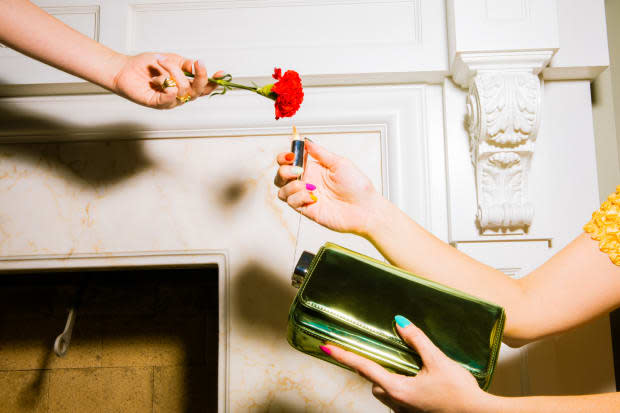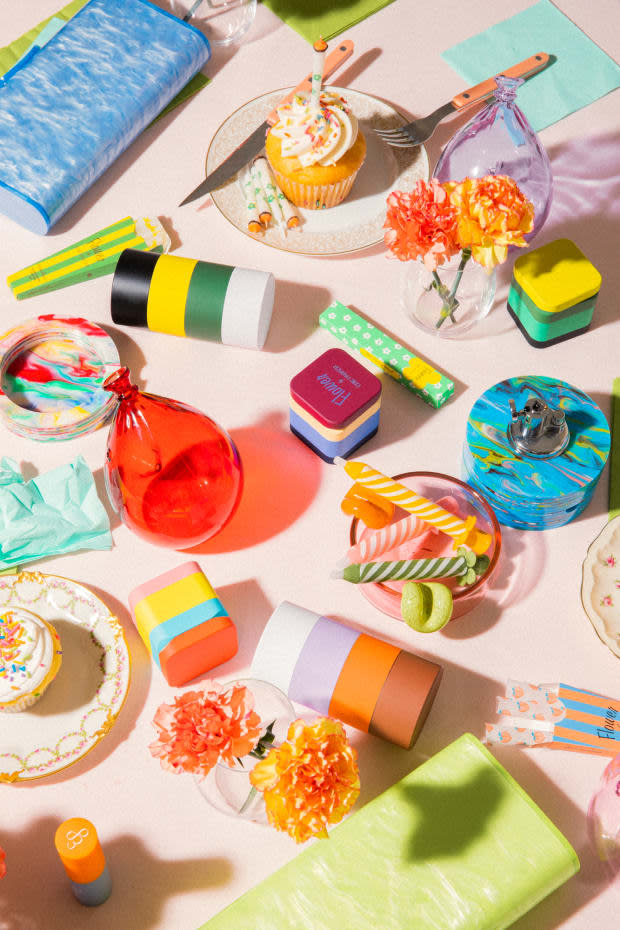How Edie Parker Fashion-ified Weed
"Cannabis doesn't have to be a health-and-wellness product. If you want to get high and look at a pretty item, then, great — we're here for that."
In 2010, Brett Heyman created Edie Parker to fill a long-vacant gap in the fashion-accessories market. It's a familiar entrepreneurial tale: the founder who identifies a niche, then rectifies it themselves. And for Heyman, that niche was acrylic clutches from the 1950s and 1960s, which she collected. When it became more and more difficult for her to find said handbags at vintage stores, she began making her own. The rest, as they might say, is history — but, in Edie Parker's case, that was just the beginning.
In the spring of 2019, the brand launched into an entirely new category that, Heyman believed, filled yet another gap in the marketplace.
"The Venn diagram of the people who are into cannabis and fashion is small," she says. "But our hypothesis is [it's] getting bigger, and people are looking for an experience like ours and a brand they can trust that gives you permission to get high and have a good time."
Flower by Edie Parker, a cannabis lifestyle brand that operates squarely at the intersection of cannabis and fashion, is just that: With price points between $10 and $800, the collection is stocked with tongue-in-cheek acrylic, ceramic and hand-blown glass accessories, like stash jars, lighters, ashtrays, grinders, bongs, pipes, rolling papers and rolling trays. It has its own line of flower, too, sold in dispensaries in states where recreational cannabis is legal, like California, Illinois and New York.
Like everything Edie Parker does, Flower is bright, beautiful and truly, just a lot of fun. The whole assortment — even the pre-rolled joints — looks to have been plucked straight from a sunny Palm Springs pool party in 1957. But the brand's exploration into cannabis hasn't been without its challenges.

Photo: Courtesy of Edie Parker
Despite a state-by-state groundswell, the plant itself remains federally illegal. In 2022, Politico reported that over 155 million Americans lived in a legal cannabis state after that year's November Election Day results — still less than 50% of the population. And, historically, this ongoing prohibition of cannabis disproportionately and adversely impacts communities of color: Despite roughly equal usage rates, Black people are 3.73 times more likely than their white counterparts to be arrested for marijuana.
Beyond the systemic racial disparity associated with the plant, cannabis still retains a lot of social stigma — stigma that, according to Verena von Pfetten, co-founder of cannabis lifestyle brand Gossamer, can be lessened by representing cannabis across un-stigmatized categories, like home, art and, of course, fashion.
"Generally, brands that operate outside of the space bring a fresh perspective," she says. "Some of the best design work in cannabis — whether that's across packaging, accessories or lifestyle products — is coming from people who have worked in other categories and can bring that fresh creative expression that isn't necessarily rooted in the standard cannabis references."
Edie Parker is unique, she says, in that it's an established fashion company that's expanded into cannabis. Unlike a cannabis brand that launches lifestyle or fashion goods, Edie Parker can not only introduce cannabis to its existing customers, but also engage cannabis consumers looking for something that might better speak to their personal aesthetic.
In other words: The tie-dyed marijuana leaf is tired. Fueled by the desire to normalize the plant, retailers have worked to rebrand how we represent cannabis in the first place.
"Weed is proving that it can be appreciated by any type of person, and this has broken open a vast potential for creative expression," says Anja Charbonneau, founder of cannabis-adjacent lifestyle publication Broccoli. "There are no aesthetic boundaries. Weed can exist within any style, and it deserves this level of creative diversity."
When Heyman first launched Edie Parker, she did so with the implicit understanding that the brand was not for everyday use.
"We used to say, 'We're with our girl every Friday and Saturday night; we want to be with her all the days of the week,'" says Heyman. "And the truth is, we don't need to be with her all the days of the week. We can be with her on special occasions, and that's fine."
Cannabis, though, represented a different opportunity — a way to cater to the Edie Parker girl more frequently, and in a manner that wasn't available at traditional retail channels, at least at the time. Obviously, it was a hit. As Heyman says: "The people who love Flower love it."
While much of its burgeoning consumer base is made up of those entering the cannabis space for the first time, Flower also pulls in the historic Edie Parker customer, according to Heyman. This is especially prevalent at its Bond Street boutique in New York City, where cheeky, fruit-shaped pipes retail alongside the brand's classic acrylic clutches and assorted homewares, like vanity trays, coasters, even checkers boards. Around the holidays, Heyman is always surprised by how many customers purchasing classic handbags also buy pipes and papers for their adult children.

Photo: Courtesy of Edie Parker
"When we launched, we depended a great deal on finding the fashion customer who also liked cannabis," says Heyman. "That's no longer the case. Most of the new Flower shoppers are finding 'Weedie Parker' first, and then learning about Edie Parker."
For Zach Sokol, the founder of Cash Only, a publication and media brand with a focus on cannabis culture, this is Flower's main value proposition: It's welcoming to the "cannabis curious" as much as the "more seasoned, conspicuous canna-consumers," and this is a boon for normalizing the plant at a time when only 15 states have legalized it.
"Companies like Edie Parker can help make cannabis feel luxurious and become something people want to promote publicly because the brand is tasteful, sexy and still authentic," says Sokol, noting that Heyman, whom he profiled in 2022, is an active consumer herself. "Edie Parker will help cannabis cross into other cultural forms, like fashion, in a way that's organic, exciting and new. I think you need brands that speak to both worlds in order for weed to integrate into industries that have avoided it in the past."
In fashion, cannabis is no longer a novelty. The plant and its varying accoutrements are now being represented by the same PR and communications firms that tout high-end fashion clients. One such agency, Chapter 2, has helped bring cannabis products into the mainstream; its clients are now found stores from The Webster to, well, Zumiez.
"Globally recognized brands have a distinctive opportunity to craft compelling messaging that can dismantle the stigma attached to cannabis use and portray it as a legitimate lifestyle choice," explains Kenneth Loo, Chapter 2's co-founder and CEO. "By promoting cannabis products as stylish and desirable, these brands are shaping cannabis culture and contributing to a more diverse and inclusive industry by expanding the range of individuals involved."
Still, cannabis has an equity problem. With recreational use inching toward widespread legalization state by state, disparities around who can safely participate in the category continue to be a concern.
Legalization hasn't solved these inequities. In Los Angeles, the number of Black individuals arrested for marijuana-related offenses has only increased since California legalized recreational cannabis in 2018. And while states and cities have adopted social equity programs that attempt to assuage these disparities, experts believe that brands, too, are responsible for advocating in equal measure. This is especially true when considering that the vast majority of the best-known players making cannabis "fashion," like Heyman, are white, including Jonathan Adler, Adam Lippes and Scott Campbell (who co-founded Beboe with former fashion executive Clement Kwan).
Often, Charbonneau explains, cannabis businesses will partner with cannabis-equity programs built to support Black and brown entrepreneurs, but these systems often have many false starts. It's more helpful to find ways to put funds directly into the communities. Broccoli facilitates the Floret Coalition, a collective of like-minded cannabis brands making monthly donations to community organizations.
"Cannabis businesses have a responsibility to show up for the Black, Latine and Indigenous people who bear the deepest scars of the war on drugs," says Charbonneau. "There are many approaches, from donating to and working with nonprofits to diversifying hiring practices or collaborations with artists and collectives who are doing valuable work on the ground."
Heyman's answer to advocacy work is the brand's own Edie Parker Foundation, a 501(c)(3) that aims to bring about criminal-justice reform and racial equality among vulnerable, largely marginalized communities through partnering organizations, including the Women's Prison Association and The Bail Project.
This past February, Edie Parker announced plans to bring its line of funky, playful cannabis products to four new states: New Jersey, Maryland, Missouri and Ohio. In 2023, even more states (like Kentucky, Minnesota and Hawaii) are angling to enact cannabis reform, with more — and more, and more — to follow in the years to come. When the time comes, Edie Parker will be there. Beyond that, Heyman isn't overthinking her strategy. For her, it's all about providing "a consistent experience that's not intimidating."
"We think it's fun to get high," she adds. "It doesn't have to be a health-and-wellness product. If you want to get high and look at a pretty item, then, great — we're here for that."
Never miss the latest fashion industry news. Sign up for the Fashionista daily newsletter.

